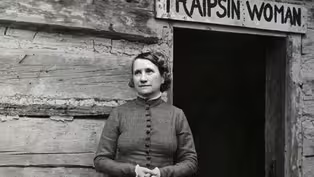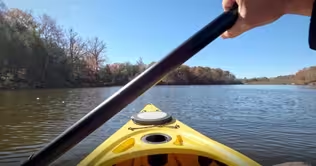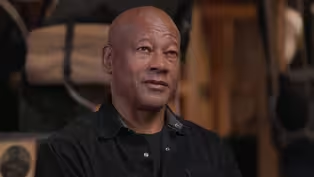
Kentucky Harp Society
Clip: Season 30 Episode 14 | 7m 1sVideo has Closed Captions
The Kentucky Harp Society looks to make harps more accessible.
Kentucky Harp Society is a chapter of the International Society of Folk Harpers and Craftsmen that is looking to make harps become commonplace in the Commonwealth! While the instrument is often viewed as exclusive and inaccessible, this society aims to change that with hands-on workshops, more affordable harps, lessons and more!
Problems playing video? | Closed Captioning Feedback
Problems playing video? | Closed Captioning Feedback
Kentucky Life is a local public television program presented by KET
You give every Kentuckian the opportunity to explore new ideas and new worlds through KET. Visit the Kentucky Life website.

Kentucky Harp Society
Clip: Season 30 Episode 14 | 7m 1sVideo has Closed Captions
Kentucky Harp Society is a chapter of the International Society of Folk Harpers and Craftsmen that is looking to make harps become commonplace in the Commonwealth! While the instrument is often viewed as exclusive and inaccessible, this society aims to change that with hands-on workshops, more affordable harps, lessons and more!
Problems playing video? | Closed Captioning Feedback
How to Watch Kentucky Life
Kentucky Life is available to stream on pbs.org and the free PBS App, available on iPhone, Apple TV, Android TV, Android smartphones, Amazon Fire TV, Amazon Fire Tablet, Roku, Samsung Smart TV, and Vizio.
Providing Support for PBS.org
Learn Moreabout PBS online sponsorshipKentucky is known for music performed on string instruments.
We have a long history dating back generations of favorites such as the fiddle, the banjo or the mandolin being played in all sorts of settings.
But one stringed instrument you may not think of around here is the harp.
The Kentucky Harp Society is working to change that and to make the angelic instrument commonplace in the Commonwealth.
[music playing] My background with the harp started early when I was young.
I was like most kids forced to play piano.
And so, I didn't enjoy practicing.
But then, we had a harpist visit our church, and I stopped everything I was doing and just focused on the harp.
And it enthralled me.
I cannot remember what she looked like, what she played, how big her harp was.
I was just like, “I want to play that.” [music playing] When I first started playing the harp, When I first started playing the harp, I really didn't know anyone else that played.
I knew there were people, of course, that played the harp in the orchestra.
But I didn't know of anyone that played the smaller style, what we consider the folk harp or lever harp.
And I found out that there is a whole society in America dedicated to the harp.
So, the International Folk Harp Society does promote harp players of all levels and all ages to pursue this instrument, not as a career instrument, but as something for joy.
[music playing] So, when I saw everything that was being done with the International Society for Folk Harpers and Craftsmen to try to connect harpists and harpers around the world with what was going on, I was like, “I want to be part of this.” And so, I signed up to be part of that.
And I said, “Hey, is there a Kentucky chapter?"
Because I saw there was chapters for different states.
And they're like, “No, would you like to start one?” And I was like, “Oh, boy.” But I reached out to a few people, and I found that there was interest.
I've been trying to reach out to any of the other harpists harpists and harpers here in Kentucky.
And my mission is to make harps more attainable here in Kentucky.
In the not-so-distant past, like, to obtain a harp was a big layout of money right away.
And that limited people, but they have had breakthroughs in designing something that's lightweight, beautiful sound, and affordable.
[music playing] What I would like is for people to come into workshops and have people actually put their hands on the harp, be able to experience it.
If it's a one-time thing and they're like, “I've done that, I played the harp,” then that would make me happy.
If it's something that they're like, “You know, I think I'd like to try this out a little bit more."
I would love to be able to connect people, either I could teach them or I connect them with other teachers that are closer by.
The other thing we'd like to do is to help get harps in schools, to introduce this instrument to a new generation that can see it's not just something for angels on fluffy clouds to be playing.
It's not just something that is for those who have the money and the resources.
But it's something available to everybody.
When I saw the harp, I thought it would be a great therapeutic instrument.
And so I really devoted myself to learning it and have used it not only in my music therapy work but have extended it to have an ensemble, a harp ensemble, and to help others learn to play it and enjoy it.
[music playing] The harp in general is a very calm instrument.
It's soothing.
That's why it's used in harp therapy to reach people, to calm people down.
In the story about David playing the harp for Saul in the Bible, it wasn't just about him listening to music and enjoying a good time.
It was actually the sound of the harp and his ability to play the harp for him actually brought about healing and changed his mood.
Nowadays, we hear a lot about music therapy and we have more scientific backing for frequencies and what they do to the body and how music can really heal in different ways.
And I found the harp to be a great instrument in healthcare settings, hospitals.
My harp ensemble at one time, we played as a group in the hallway in a hospital where I was working at the time.
And the charge nurse came out and said, “We administered less pain medication during your hour that you are here than we normally do during that hour.” [chorus singing] After I had first encountered the harp, a couple of years later, I was in a freak accident, which ended up burning my hands really bad.
I had fourth-degree burns and had to have two plastic surgeries, two months in the hospital.
At one point, one of the doctors wanted to cut off my hands.
They ended up doing the best they could with plastic surgery, but my hands would still never be the same.
But I have the function, I had to do many years of physical therapy for it.
And then we moved to New York City, and I found this harp instructor.
And I went to her and said, “Can I even play the harp?” I didn't know if I could play the harp with what had gone on with my hands.
And she said, “Sure, we'll make the harp work for you.” And that was so freeing because there was other things I had to give up because of my hands being damaged.
And actually, the harp became like a physical therapy and something that that healed me even more and gave me the dexterity and the mobility that I needed for other things.
And so now when I play, that is something I give thanks for.
That every time I touch the strings of the harp, it was in praise that I could even do something with my hands, that I had come that far to be able to play and to make music.
[music playing]
Jean Thomas: The Traipsin' Woman
Video has Closed Captions
Clip: S30 Ep14 | 6m 2s | Jean Thomas traveled through Appalachia documenting traditions of the region. (6m 2s)
Video has Closed Captions
Clip: S30 Ep14 | 4m 54s | Chip explores Kincaid Lake State Park by kayak in Falmouth, Kentucky. (4m 54s)
Poets of Kentucky: Frank X Walker
Video has Closed Captions
Clip: S30 Ep14 | 7m 17s | The first African American to hold the honor of Kentucky's Poet Laureate. (7m 17s)
Providing Support for PBS.org
Learn Moreabout PBS online sponsorshipSupport for PBS provided by:
Kentucky Life is a local public television program presented by KET
You give every Kentuckian the opportunity to explore new ideas and new worlds through KET. Visit the Kentucky Life website.
















